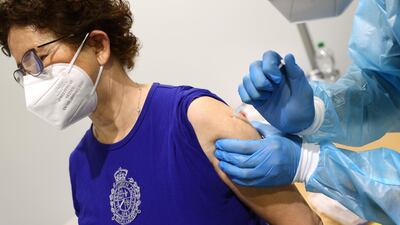Covid-19 tension was exposed on Saturday as the EU threatened to block the export of vaccines in a row over failed deliveries.
Ursula von der Leyen, President of the European Commission, said the bloc received only 33 per cent of the vaccine doses it was promised.
The EU has been criticised for placing a temporary ban on the AstraZeneca-Oxford shot and its sporadic inoculation programme, which has been slower than those of the UK and US.
Cases are rising in 20 member states, including Germany and France, and some fear a third wave is imminent.
“We have the option of banning a planned export. That’s the message to AstraZeneca: you fulfil your contract with Europe first before you start delivering to other countries,” Ms von der Leyen said.
Ms Von der Leyen said the EU had only received 30 million doses of the 90 million AstraZeneca vaccines it had been promised by the end of March.
The company blamed production delays but European officials are furious that AstraZeneca has been able to deliver its UK contract while falling short on the continent.
“We haven’t received anything from the Brits, although we are delivering to them,” Ms von der Leyen said.
“I can’t explain to European citizens why we are exporting millions of vaccine doses to countries that are producing vaccines themselves and aren’t sending us anything back.”
EU-based manufacturers have shipped 41 million vaccine doses to 33 countries since early February, Ms von der Leyen said, making the bloc one of the world’s biggest export regions for Covid-19 vaccines.
French European Affairs Minister Clement Beaune welcomed the tougher tone from Brussels.
"We need a principle of reciprocity: supply others if they supply us in accordance with signed contracts," he said.
There are concerns that the low vaccination rates are contributing to the rising rate of new cases.
“We have exponential growth ... so it is good we had agreed on an emergency brake and unfortunately we will have to make use of this emergency brake,” German Chancellor Angela Merkel said.
She said the lifting of lockdown restrictions was likely to be a slower process.
French Prime Minister Jean Castex said his country was facing a “third wave” of the coronavirus as new restrictions were introduced in Paris.
Most businesses and public venues in Poland are closing as the health service struggles to cope with more patients on respirators than at any period over the last year, while Hungary has extended its nationwide lockdown for another week.
The European Medicines Agency on Thursday confirmed the AstraZeneca shot “safe and effective” and vaccination has since resumed in some countries.














